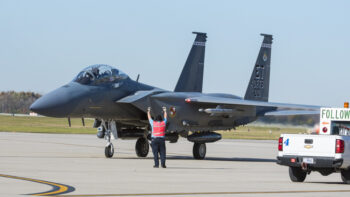
Kinetic ASATs could create enormous amounts of dangerous space debris. (Image: National Space and Intelligence Center)
WASHINGTON: The United States sees its new proposal for a limited anti-satellite (ASAT) weapons test ban as only a first step toward a larger package of international norms to bound national security space activities — and already has developed concepts for a number of other steps, a senior State Department official said.
This includes a potential proposal to refrain from “purposeful interference” with the command and control systems of national security satellites, said Eric Desautels, acting deputy assistant secretary for arms control, verification and compliance.
“We recognize our ASAT commitment doesn’t cover all ASAT threats, including space-based ASAT systems. But we think it is important to take a first step to address the most pressing threats,” he told a webinar sponsored by the British American Security Information Council (BASIC) and the Third Nuclear Age Project at the University of Leicester, United Kingdom.
Vice President Kamala Harris, who chairs the National Space Council, on April 18 announced a unilateral US ban on destructive testing of ground-launched anti-satellite missiles, and called on other nations to follow suit to ensure the safety of the heavens.
Desautels outlined a handful of other ideas that the US hopes to see discussed by the UN in the upcoming series of meetings to hash out principles and norms designed to to curb the risks of conflict sparked by dangerous and/or threatening military activities in space.
The Biden administration has pledged to be a leader in the UN process, which was spearheaded last year by the United Kingdom and supported by a large majority of the 193 UN member countries. This past December, Harris charged the National Security Council with leading a US interagency effort to come up with a set of proposals.
The UN group, formally called the “Open Ended Working Group (OEWG) on Reducing Space Threats Through Norms, Rules and Principles of Responsible Behaviours,” will hold its first set of discussions starting on May 9 in Geneva.
Besides a prohibition on tampering with national security satellite C2 systems (something that could be particularly dangerous if the satellites involved are those used for nuclear C2), Desautels said Washington would be interested in:
- “enhancing communications,
- “developing best practices or responsible behaviors regarding safe and professional operations of national security satellites in order to avoid potential collisions or other harmful interference, and
- “elaborating best practices of responsible behavior that avoid simulating or testing a set weapons in the direction of or in close proximity to another state satellites.”
Finally, he said, it “will be important” that the UN working group takes steps to ensure whatever is agreed “does not in any way restrict the peaceful uses of outer space technology by developing countries.”
The issue of protecting the rights of developing countries is actually one of the keys to success of the working group, other experts speaking at the panel agreed. Most developing countries are members of the Non-Aligned Movement, or NAM, voting bloc within the UN — the largest within the system. And any recommendations coming out of the OEWG for new norms must be approved by consensus.
“We wouldn’t want a repeat of what happened to the EU Code of Conduct,” said Bleddyn Bowen, associate professor at the University of Leicester. “Hopefully one of the strengths of the UN General Assembly process is that it is going to be hopefully more inclusive and multilateral than other things.”
The EU proposal for a voluntary international code of conduct for space, despite widespread agreement that the norms it advocated were worthy, went down in flames on the international stage in 2015 in large part because the NAM viewed the process as Western-centric and felt that the concerns of developing nations were not taken into account.
“To me, the consensus and inclusive approach are quite important,” said Raji Pillai Rajagopalan, director of the Centre for Security, Strategy and Technology (CSST) at the Observer Research Foundation in India. “The advantages of having of a large number of states to agree to a set of principles, norms outweighs … having the most ideal document.”





















